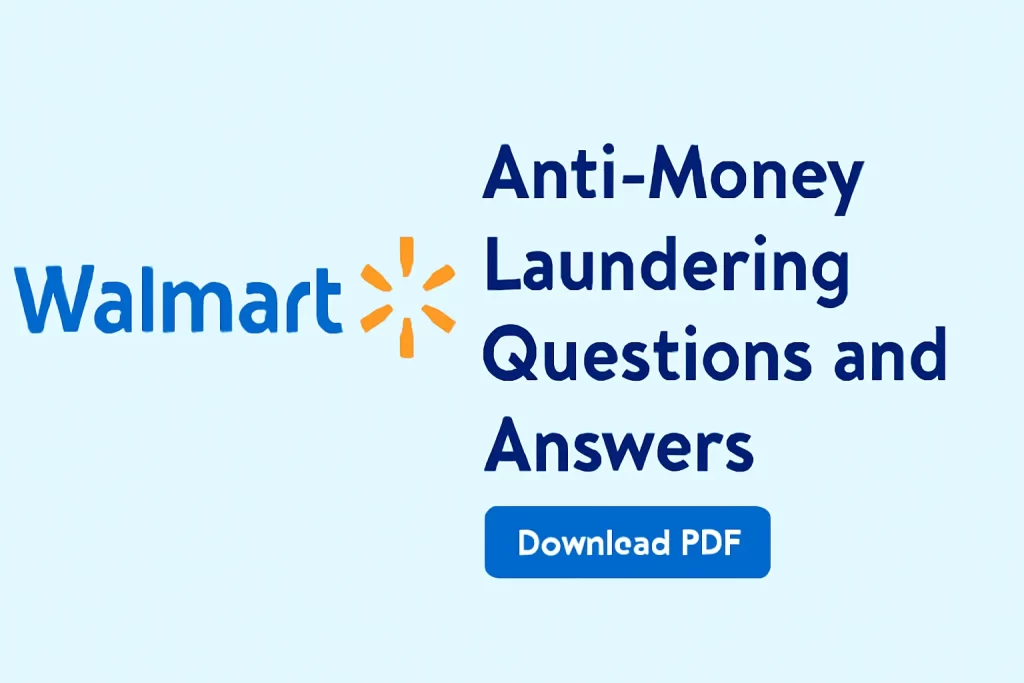What is Walmart’s stance on Anti-Money Laundering (AML)?
Walmart is committed to complying with all applicable anti-money laundering laws and regulations. The company works diligently to ensure its operations do not become involved in money laundering activities. Walmart employs various AML controls and training programs to prevent, detect, and report suspicious activities.
How does Walmart ensure compliance with AML regulations?
Walmart follows the regulations set by governing bodies such as the U.S. Department of the Treasury’s Financial Crimes Enforcement Network (FinCEN) and international regulations like the European Union’s Fourth Anti-Money Laundering Directive. The company has developed a comprehensive AML program that includes customer due diligence, transaction monitoring, employee training, and reporting mechanisms for suspicious activities.
What is the role of Walmart employees in AML efforts?
Walmart employees are trained to recognize suspicious activities and are encouraged to report any concerns to their designated compliance officer. Regular training programs are conducted to help employees understand money laundering risks and how to identify potential red flags.
What types of activities are considered suspicious in the context of AML?
Activities such as structuring transactions to avoid reporting requirements, frequent large cash deposits, and individuals or entities that appear to be attempting to conceal their identity or source of funds can be considered suspicious. Walmart monitors transactions for such red flags and reports them as necessary.
What is “Know Your Customer” (KYC), and how does Walmart implement it?
KYC is a key part of AML compliance. It refers to the process of verifying the identity of customers to prevent fraud and money laundering. Walmart has KYC procedures that involve verifying customer identity and ensuring the legitimacy of transactions, especially for financial services offered through Walmart’s banking and payment platforms.
What is Walmart’s policy on large cash transactions?
Walmart closely monitors large cash transactions. In line with AML regulations, Walmart is required to report cash transactions over a certain threshold (e.g., $10,000) to the authorities. This is done to ensure that any attempts to launder money are detected early.
How does Walmart train its employees on detecting money laundering activities?
Walmart conducts mandatory training programs for its employees, particularly those in financial services, cash handling, and customer service roles. The training includes recognizing suspicious activities, understanding regulatory requirements, and following the correct procedures for reporting concerns.
What is the process for reporting suspicious transactions at Walmart?
If an employee notices a suspicious transaction, they are required to report it to their immediate supervisor, compliance officer, or through Walmart’s internal reporting system. The company then assesses the transaction to determine if it needs to be reported to the relevant authorities.
Does Walmart collaborate with law enforcement on money laundering investigations?
Yes, Walmart works closely with law enforcement agencies, including the FBI and local authorities, to assist in money laundering investigations. Walmart follows all legal requirements to cooperate and provide relevant information when requested.
How does Walmart protect customer data about AML?
Walmart ensures that all customer data collected for AML compliance is handled with the highest level of security and privacy. The company adheres to strict data protection regulations, ensuring that personal information is only shared with authorized personnel or agencies as required by law.
What are the consequences for non-compliance with AML regulations at Walmart?
Non-compliance with AML regulations can result in serious legal and financial consequences, including fines and reputational damage. Walmart holds its employees accountable for adhering to AML procedures and may impose disciplinary action if policies are violated.
What role does technology play in Walmart’s AML efforts?
Walmart utilizes sophisticated technology, including automated transaction monitoring systems, to detect unusual or suspicious activities in real-time. These systems help flag potentially suspicious transactions for further investigation, enhancing the company’s ability to prevent money laundering.
How often are Walmart’s AML procedures audited?
Walmart’s AML procedures are regularly audited both internally and by external regulators to ensure compliance with all relevant laws. The company works with auditors to identify areas for improvement and implement necessary changes to strengthen its AML practices.
What actions does Walmart take if a suspicious transaction is detected?
Once a suspicious transaction is detected, Walmart investigates the activity. If the investigation confirms that the transaction is indeed suspicious, Walmart may file a Suspicious Activity Report (SAR) with the appropriate authorities, such as FinCEN.
What is the role of the compliance officer in Walmart’s AML program?
Walmart’s compliance officer is responsible for overseeing the company’s AML efforts, ensuring that all regulations are followed, and handling any reports of suspicious activities. They play a critical role in implementing policies, training staff, and liaising with law enforcement when necessary.
Download Now PDF





